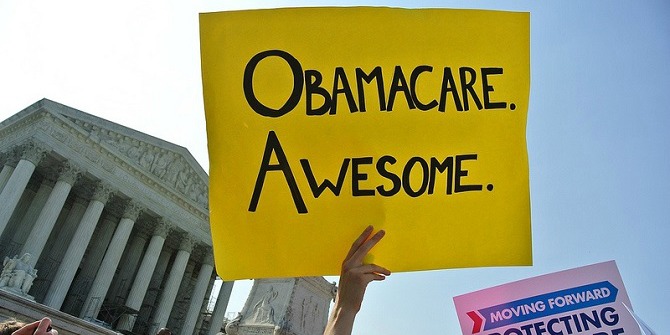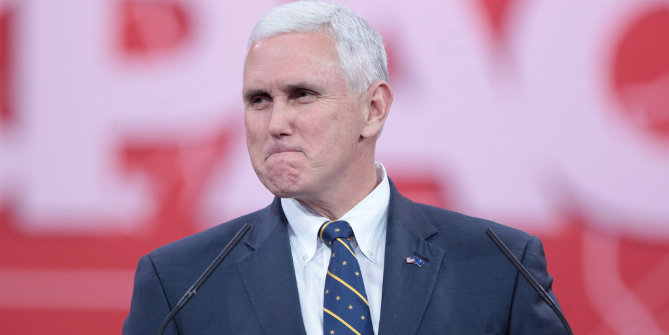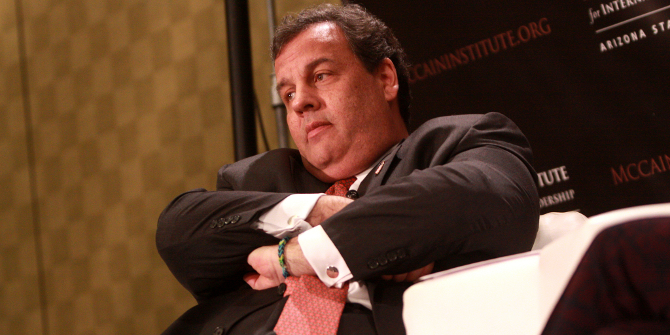USApp Managing Editor, Chris Gilson looks at the best in political blogging from around the Beltway. Our round-up of state blogs will follow on Saturday afternoon.
President Obama, the Democratic Party, and the GOP
This week saw President Obama give his annual State of the Union address to Congress, with much commentary focusing on his policy announcements and relationship with the newly Republican controlled legislature. Ahead of Tuesday night’s speech, The Daily Signal gives 112 promises from previous State of the Union addresses that Obama hasn’t kept. These include cutting the deficit in half, securing America’s borders and no tax increases for those earning less than $250,000. The American Prospect has some advice for Obama as to what to say in his address, such as raising the minimum wage to $12.50, support for collective bargaining, and increasing the overtime threshold to at least $51,000 a year. On Tuesday, The Brennan Centre for Justice looks at reports of the ‘demise’ of the State of the Union speech, writing that while its importance has diminished, it is still a rare way for the President to put across his agenda to a very wide audience.
Ahead of the speech, Daily Kos previews Obama’s new tax plan, which would extend tax credits to middle class families while increasing taxes on the wealthy and on banks. For Wonkblog, Obama’s proposals are another attempt by the President to ‘get the middle class going again’, and raise median incomes. Hit & Run meanwhilereckons that the tax hike is ‘empty…populism’, given that it is unlikely to be passed by the Republican Congress, and that his rhetoric doesn’t capture the full reality of the increases he proposes.
Late on Tuesday, PoliticusUSA reviews the speech, writing that it was a “dominate performance by the president”, who made strong points on income inequality, climate change, and the state of the economy. Writing on Wednesday, The Atlantic says that the President sounded so exuberant because the state of the economy meant that he did not need to mention debt or deficits, unlike in previous years. The Daily Signal is surprised by some of the proposals in Obama’s State of the Union, such as increasing the minimum wage, and issuing a resolution authorizing the use of force against ISIS. Townhall is much more negative, writing on Thursday that despite an enthusiastic and energized delivery, President Obama’s demeanor belies his political reality. They say that he was not subdued or humbled by last year’s midterm Republican wave election, and that he is still sure his agenda must come out on top.

Moving on to the Democratic Party more generally, The Atlantic wonders if Democrats will spoil Obama’s trade initiatives. They say that the Obama administration wants trade promotion authority which would allow it to negotiate deals that would only need Congressional approval – not oversight. Republicans are in favor, but many Democrats are wary of free trade because of competition from overseas. On Monday, Crooks & Liars looks at why Senator Elizabeth Warren (MA) strikes such a strong chord with the left of American politics. They say that Warren shows that knows what goes on in people’s everyday lives, and is able to talk about complicated subjects – like the financial crisis – in an easily and accessible way.
Traditionally, the Republican Party gives a response to the President’s State of the Union address, outlining their points of disagreement, and their own vision. Ahead of the response, Daily Kos looks at whether or not the GOP can avoid embarrassment in their responses, given that in previous years their performance has been less than stellar (remember Marco Rubio’s water bottle in 2013, anyone?). United Liberty suggests that Republicans can fix their terrible State of the Union responses by giving it to a more interactive audience as Virginia Governor (and now convicted felon) Bob McDonnell did in 2010. Recently elected Senator Joni Ernst (IA) gave the response this year – FreakOutNation writes that her response was missing a response to Obama’s speech, instead talking about the GOP’s priorities. National Journal covers Kentucky Senator Rand Paul’s response – he emphasized that government should ‘do no harm’. Political Animal summarizes many conservatives’ responses as ‘petulant’ and argues that Obama didn’t give Republicans the speech that they wanted by not mentioning the Republicans’ recent Congressional victories.
This week also saw the Republicans drop a bill which would ban late-term abortions after pressure from female GOP lawmakers in the House. The Atlantic writes on the vise that the party now finds itself in over abortion, as the majority of Americans still back legal abortion. The Federalist wonders what the GOP is actually able to do given that it was unable to pass the abortion ban. On Sunday, the Monkey Cage argues that the Republican Party is fighting to change a decades-old stereotype that it is less likely to care about ‘ordinary’ people, and that it is a party for the wealthy.
Elections and the road to 2016
On Sunday, PoliticusUSA reports that a new poll shows that the Democrats’ frontrunner for the 2016 presidential nomination, Hillary Clinton, leads against potential Republican nominees Jeb Bush and Mitt Romney by 52% to 40% and 49% to 43%, respectively. Wisconsin GOP Governor Scott Walker attacked Hillary Clinton this week, according to Crooks & Liars, criticizing her for having a close relationship to Washington. The Atlantic meanwhile, argues that Hillary Clinton was the ‘real target’ of Obama’s State of the Union, which may have hemmed her in in terms of domestic policy proposals. National Journal looks at the other side, writing on how Clinton will distance herself from President Obama – by focusing on delivering on her priorities.
Moving on to the GOP’s preparations for the 2016 presidential election, Outside the Beltway writes on Saturday that the Republican National Committee has proposed to limit the number of candidate debates to nine, starting this August and continuing through March 2016. More than 20 were held in the 2012 election cycle. Looking more closely at who may be in those upcoming debates:
- Florida Senator Marco Rubio says that the biggest challenge facing the next President will be national security (The Daily Signal);
- Dr Ben Carson is exploring a bid (PoliticusUSA);
- …so is South Carolina Senator Lindsay Graham (Daily Kos);
- former CEO Hewlett Packard, Carly Fiorina may also be in the running as a ‘different’ voice (The Daily Signal);
- and, as a successful conservative from a blue state, Wisconsin Governor Scott Walker may offer the best to chance to use a Republican Congress to transform American government (American Thinker).

Last week saw murmurings that the 2012 Republican nominee, Mitt Romney, may be considering another run for the presidency. National Journal writes that Romney is bleeding establishment support, with many of his former backers lukewarm at the idea. Despite the lack of enthusiasm amongst senior members of his own party, according to a new poll, 59 percent of Republicans would like to see him in the race, compared to 50 percent in favour of former Florida Governor, Jeb Bush, according to Outside the Beltway.
Government, the Beltway and Congress’ agenda
On Monday, Daily Kos looks at whether or not Attorney General, Eric Holder’s recent announcement that federal civil asset forfeiture programs will be curtailed will be effective. They say the move, which should stop law enforcement from seizing a suspect’s property if they suspect it’s been involved with committing a crime, may have loopholes for joint state and federal police officials working together on an investigation.
The Daily Signal says that executives in the Department of Health and Human Services spent $31 million on 7,000 first and business class flights between 2009 and 2013, according to data released under the Freedom of Information Act.
Looking at the Supreme Court this week, Hit & Run writes on Tuesday that the Court has issued a decision that strikes down an Arkansas prison policy that prevents a Muslim inmate from growing a ½ inch beard. Wonkblog says that the Supreme Court is now hearing a Texas case which challenges how the state’s housing agency allocates low-income housing tax credits to developers for affordable housing. At the moment, most of these are allocated to developments in high poverty, minority neighborhoods, essentially acting as a form of segregation.
Moving to the House of Representatives, this week, Speaker John Boehner invited the Israeli Prime Minister, Benjamin Netanyahu to address Congress in March, in a move many say was intended to snub President Obama. Political Animal argues that it is not a breach of protocol for Speaker Boehner (despite what the White House has stated); but that it’s a bad idea for the Israeli Prime Minister. Meanwhile, The Daily Signal says that House conservatives issued a ‘stern message’ this week to their colleagues in the Senate to start fighting for the passage of legislation that would roll back President Obama’s immigration policies of the past several years. Last week the House sent the Senate a bill that would fund the Department of Homeland Security, but with amendments, would also repeal some of the President’s immigration policies. On Thursday, Outside the Beltway says that it was ‘smart politics’ for House Republicans to drop the abortion bill vote (as discussed earlier). They say that while many conservatives are unhappy about the bill being dropped, it would have been vetoed by the President in any case.
Talking Points Memo says on Tuesday that Senate Majority Leader, Mitch McConnell (R-KY) has stated that Senate Republicans will not make any changes to the social security eligibility (as is being pushed by the House), without Democratic support. On Wednesday, Independent Senator, Bernie Sanders of Vermont filed a new amendment to the Constitution that would overturn the Supreme Court’s 2010 Citizens United decision on campaign finance. According to PoliticusUSA, Sanders’ amendment would halt the Court’s decision that money is the same as speech. This week also saw the Senate vote to approve an amendment to the bill to approve the Keystone XL oil pipeline, reports Daily Kos. The amendment is significant in that it states that climate change is real. A second amendment stating that climate change is caused by humans was voted down.
Foreign policy, defense and trade
On Wednesday, Informed Comment writes on Obama’s State of the Union. They say that the President ‘pushed back hard’ against hawks like Senator John McCain (R-AZ) who are keen to increase U.S. military presence in countries such as Syria. They also write that Obama pointed out that if Congress derails negotiations with Iran over its nuclear program, then this will mean going to war down the road. RedState couldn’t disagree more, arguing that Obama’s State of the Union was an announcement of surrender to Iran, accusing the country of continuing its nuclear program and increasing its nuclear stockpile.
The Daily Signal this week looks at the current state of the U.S.-Japan alliance. They say that the recent increases in Japan’s defense budget will help to strengthen that country’s alliance with the U.S., as it will give it the global reach needed to protect their mutual interests.
Obamacare and health policy

In healthcare news this week, Daily Kos says that the Congressional Budget Office (CBO) has refuted the latest challenge to Obamacare in the Supreme Court, 68 times. The case, King v. Burwell, is over whether or not federal subsidies can be used to fund federal exchanges in states that have refused to set up their own health insurance exchanges. Not one of the 68 CBO reports on Obamacare discusses limiting subsidies to states that have set up their own exchanges. Meanwhile, The American Interest writes that the battle over Obamacare is only just beginning, with state legislatures filing more than 700 related bills in 2014, some to expand parts of the program, others to curtail it.
Wonkblog says that while the Obamacare debate continues, the Children’s Health Insurance Program is at risk of being dropped entirely. They write that Congress will need to vote to continue funding for the program that covers 8 million children in August – if they don’t, many will risk losing coverage.
The economy and society
This year the Supreme Court is expected to rule on whether or not states can enact laws that prohibit same-sex marriage. While some commentators have stated that the Supreme Court’s ruling on the matter will end the debate, The Federalist is not so sure. They say that given that Roe v. Wade 42 years ago did not end the debate over abortion, it is also likely to be the case for same-sex marriage.
The recent fall in oil prices has been reflected by plummeting petrol prices. But one place you won’t see falling prices is in airline tickets, writes Wonkblog this week. They say that airlines are refusing to pass on savings to travellers, as they will be focusing on paying down debt and giving more cash to shareholders, and that demand for plane tickets is still high.
And finally…
The Atlantic has a fascinating interactive map which shows the 1,410 different places in the world that presidents have mentioned in 224 State of the Union speeches.
Roll Call’s Hawkings Here looks at why members keep coming to the State of the Union speech.
The Monkey Cage has a State of the Union bingo card for its readers.
Featured image credit: NASA HQ PHOTO (Flickr, CC-NC-2.0)
Please read our comments policy before commenting.
Note: This article gives the views of the author, and not the position of USApp– American Politics and Policy, nor of the London School of Economics.
Shortened URL for this post: http://bit.ly/1CKc8qd






